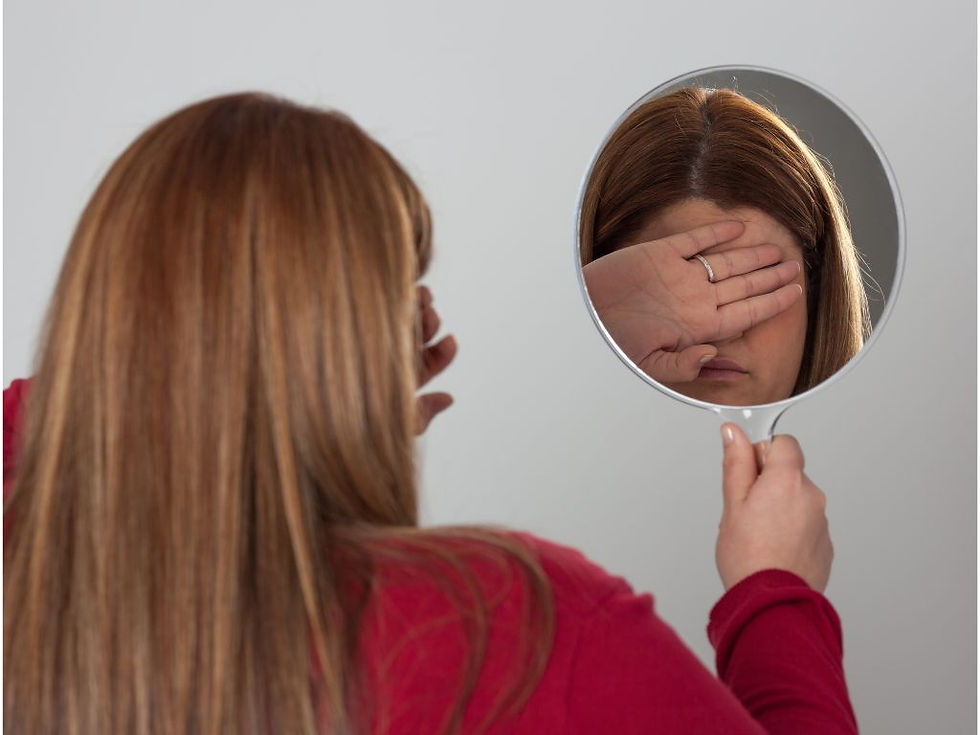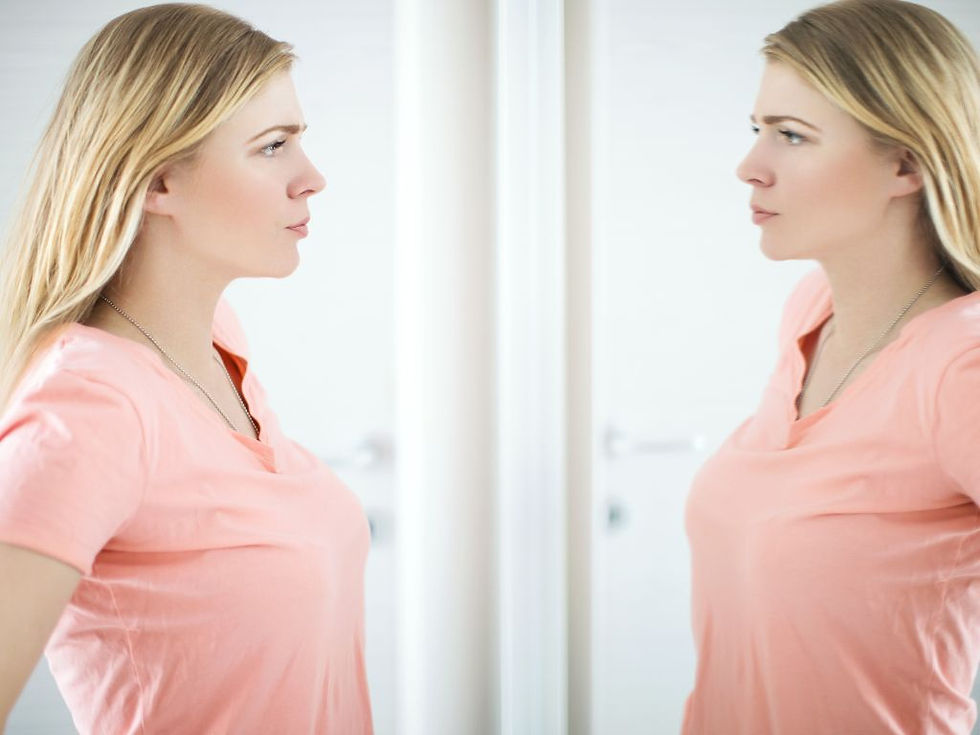The Impact of Negative Body Image on Your Well-being
- Aman Chandra
- Sep 8, 2020
- 5 min read
Updated: Apr 22

What to Know About a Negative Body Image and How to Overcome It
Negative body image is more than just disliking how you look; it affects your mental, emotional, and even physical well-being. Many people struggle with self-criticism, unrealistic beauty standards, and low self-esteem, leading to anxiety and depression. Overcoming a negative body image requires self-awareness, self-compassion, and proactive steps toward self-acceptance.
What is a Negative Body Image?
A negative body image refers to a distorted perception of your own body. It often involves feelings of shame, self-consciousness, and dissatisfaction with your appearance. People with a negative body image may:
Constantly compare themselves to others
Feel uncomfortable or anxious about their looks
Engage in excessive dieting or exercise to change their body
Avoid social situations due to body insecurities
Have unrealistic expectations of their body
Developing a positive body image is essential for mental well-being and self-confidence.
Can a Negative Body Image Lead to Other Issues?
Yes, negative body image can significantly impact various aspects of life. It can lead to:

Low self-esteem: Feeling unworthy or not good enough.
Depression and anxiety: Constant worries about appearance can lead to mental health struggles.
Eating disorders: Issues like anorexia, bulimia, or binge eating disorder can arise from body dissatisfaction.
Social withdrawal: People may isolate themselves to avoid judgment.
Unhealthy habits: Over-exercising, extreme dieting, or even cosmetic surgery addictions can develop.
Addressing negative body image early can prevent these complications and improve overall well-being.
Signs and Symptoms of a Negative Body Image
Recognizing the signs of negative body image is the first step toward overcoming it. Common symptoms include:
Frequent self-criticism: Saying things like “I look awful” or “I hate my body.”
Obsessive mirror checking: Constantly looking for flaws.
Avoiding mirrors: On the other hand, some people avoid mirrors entirely.
Comparing yourself to others: Feeling inadequate when looking at social media or celebrities.
Hiding your body: Wearing baggy clothes to cover up.
Emotional distress: Feeling anxious, depressed, or stressed about your looks.
Unrealistic weight goals: Setting extreme body expectations that are difficult to achieve.
If you relate to several of these signs, it may be time to take action.
What Are the Treatment Options?
If negative body image is severely affecting your life, seeking professional help can be beneficial. Treatment options include:
1. Therapy
Cognitive Behavioral Therapy (CBT): Helps reframe negative thoughts and build healthier self-perception.
Body Image Therapy: Specifically targets body dissatisfaction and promotes self-love.
Group Therapy: Offers support from others facing similar struggles.
2. Mindfulness and Self-Compassion Practices
Meditation and journaling can help shift focus from criticism to appreciation.
Practicing gratitude for your body’s abilities instead of just its appearance.
3. Nutrition Counseling
Helps develop a healthier relationship with food and break cycles of disordered eating.
4. Limiting Social Media Exposure
Unfollowing accounts that promote unrealistic beauty standards.
Following body-positive influencers who encourage self-love.
5. Medical Intervention
In some cases, medication for anxiety or depression may be necessary alongside therapy.
What Steps Can You Take to Help Overcome a Negative Body Image?
Even small daily changes can help improve your body image. Consider trying the following:

1. Challenge Negative Thoughts
When you catch yourself thinking negatively about your body, ask, “Would I say this to a friend?”
Replace negative thoughts with positive affirmations.
2. Practice Self-Care
Engage in activities that make you feel good, like yoga, dancing, or nature walks.
Choose outfits that help you feel both comfortable and confident.
3. Surround Yourself with Positivity
Spend time with supportive people who uplift you.
Avoid toxic relationships that make you feel insecure.
4. Focus on What Your Body Can Do
Appreciate your body for its strength, endurance, and capabilities.
Keep a journal of non-appearance-related qualities you love about yourself.
5. Engage in Media Literacy
Recognize that many images online are edited and unrealistic.
Stop comparing yourself to highly filtered social media content.
6. Seek Professional Support
If self-help efforts are not enough, talk to a therapist who specializes in body image issues.
How Does a Negative Body Image Relate to Eating Disorder Development?
Negative body image is one of the biggest risk factors for developing eating disorders. The constant dissatisfaction with one’s appearance can lead to extreme behaviors like:
Restrictive dieting: Eating far too little to lose weight rapidly.
Binge eating: Consuming large amounts of food to cope with emotions.
Purging behaviors: Using vomiting, laxatives, or excessive exercise to control weight.
Obsessive weight control: Weighing oneself multiple times a day and panicking over small changes.
The Role of Social Media in Negative Body Image
Social media can greatly contribute to negative body image. Constant exposure to edited and filtered images can make people feel inadequate. To counteract this:
Follow body-positive accounts that promote diverse body types.
Limit screen time to avoid unrealistic comparisons.
Remind yourself that social media is not a true representation of reality.
The Link Between Negative Body Image and Self-Worth
When body image becomes a primary factor in self-worth, it can be damaging. True self-worth is built on:
Personal achievements
Kindness and compassion
Strengths and talents beyond appearance
How Parents Can Help Their Children Develop a Healthy Body Image
Avoid making negative comments about body size, weight, or food.
Encourage healthy lifestyle choices rather than focusing on appearance.
Praise children for qualities beyond looks, such as kindness and intelligence.
Final Thoughts
Negative body image can deeply impact mental and emotional well-being, sometimes triggering intense distress that calls for instant anxiety relief techniques. However, by recognizing its signs, seeking the right support, and practicing self-compassion, it is possible to break free from the cycle of self-criticism. Learning to appreciate and respect your body is an essential step toward overall happiness and health.
If you or someone you know is struggling with negative body image, consider reaching out to a mental health professional for guidance on managing these feelings and finding instant anxiety relief when needed. Healing is possible, and everyone deserves to feel comfortable and confident in their skin.
About the author, Aman Chandra -

Dealing with the separation of his parents at the age of two years and battling crippling anxiety and obsessive-compulsive disorder (OCD) at the age of twelve years are just a few of the challenges that Aman dealt with. With a burning desire to learn “how to be happy in life” despite there being so much suffering, Aman began a life-long journey of studying under various global personal and spiritual growth masters, such as Eckhart Tolle and Tony Robbins. With this was born his tried-and-tested Bulletproofing-HappinessTM formula, and he uses the same to coach seekers across the globe on how to overcome challenges and live a truly happy life.
DID YOU ENJOY THE ABOVE POST? DROP YOUR COMMENTS BELOW TO SPARK A CONVERSATION!




True. Body image plays a big role